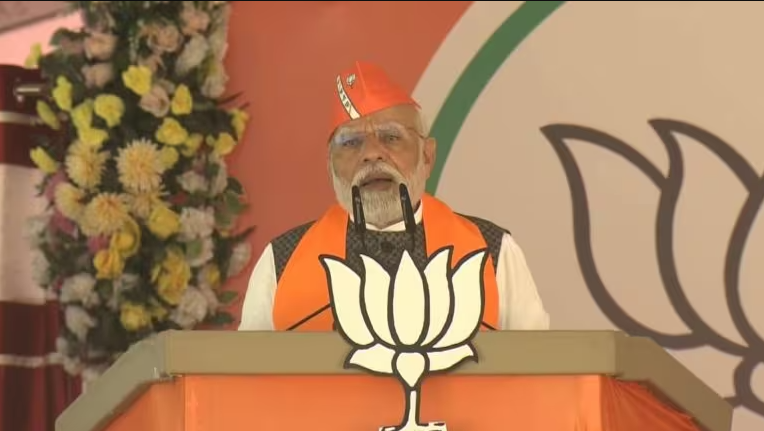On November 8, Prime Minister Narendra Modi undertook a visit to Madhya Pradesh, which is gearing up for imminent elections.
After addressing a gathering in Damoh, the Prime Minister is scheduled to hold rallies in Guna and Morena, within the Gwalior-Chambal region, a stronghold of Jyotiraditya Scindia.
The elections for the 230-member Madhya Pradesh assembly are set to take place on November 17, pitting the BJP, led by Chief Minister Shivraj Singh Chouhan, against a robust challenge from seasoned Congress leader Kamal Nath.
The electoral campaign, under the theme “Modi Ke Mann Mein MP” (MP close to Modi’s heart) and the slogan “Phir Is Baar BJP Sarkar” (BJP government once more), is poised to intensify with Prime Minister Modi as the focal point.
A BJP insider stated, “The election will be fought under the leadership of Narendra Modi and the work done by the Union and state governments. The PM is the most popular leader, so he automatically becomes the choice for leading the campaign.” Reports also indicate that projecting the PM as the face of the campaign can help maintain voter continuity for the upcoming Lok Sabha polls.
There is also speculation that the BJP may refrain from announcing Chouhan as its chief ministerial candidate due to concerns about a “fatigue factor” resulting from his decade-long tenure.
Union Home Minister Amit Shah had earlier stated, “The BJP will decide on the chief minister’s post only after the elections.”
Furthermore, naming a chief ministerial candidate could have triggered factionalism, given the numerous aspirants in line. For the assembly elections, the BJP is relying on Modi’s charisma and Chouhan’s widespread appeal.
The party’s strengths lie in various welfare schemes, such as the “Ladli Bahna Yojana,” initiated by Chouhan, which provides financial aid to eligible women. Chouhan is renowned for launching various welfare programs, including the provision of rice at Re 1 per kilogram for the impoverished, the Sambal scheme offering maternity support to women laborers, and free education for underprivileged girls, among others.
These welfare initiatives played a pivotal role in the BJP’s electoral victories in the 2008 and 2013 assembly elections. The party is counting on the combined appeal of Hindutva, development, and the promise of “double engine” growth. By fielding some of its Members of Parliament and Union ministers from the state, the BJP aims to garner mass support. The party is also relying on its National General Secretary, Kailash Vijayvargiya, renowned as a “crowd-puller.”
The BJP has nominated three Union ministers – Narendra Singh Tomar, Faggan Singh Kulaste, and Prahlad Patel – along with four Lok Sabha MPs – Rakesh Singh, Ganesh Singh, Riti Pathak, and Uday Pratap Singh, in anticipation of conveying a message of collective leadership contesting the polls.
The prospect of Congress, AAP, and Samajwadi Party running separate campaigns could potentially work to the BJP’s advantage. Traditionally, the SP, BSP, and other parties, apart from Congress, have played marginal roles in Madhya Pradesh politics.

